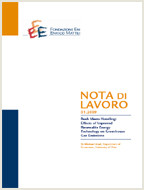Oil Revenues, Ethnic Fragmentation and Political Transition of Authoritarian Regimes

18.04.2012
Alessandro Cologni, Matteo Manera
C72, D74, O13, P16
Natural Resources, Rentier States, Conflict and Endogenous Political Regimes
Energy: Resources and Markets
Giuseppe Sammarco
Natural resources are generally associated to negative effects on the political environment of a country. This paper explores the impact that oil revenues have on the establishment of a given political system. Based on previous literature, a political economy perspective is employed. A simple game theoretical approach in order to explain the relationships between oil revenues, political instability (conflicts) and emergence of different political systems is presented. The implementation of particular redistributive fiscal policies together with the possibility that paternalistic or “predatory" autocracies emerge are considered. Under certain circumstances, a process of full democratization is argued not to represent an optimal choice for the oil-rich authoritarian nations. Since governments prefer to remain nondemocratic, in order to prevent internal conflicts from occurring, authoritarian countries have to undertake redistributive activities. Under other assumptions, governments of oil-rich nations prefer to introduce large military sectors. The present analysis determines how the emergence of redistributive of predatory policies depends on relevant parameters related to initial income, oil revenues and social inequality. Finally, we study the importance of socio-ethnical fragmentation in determining the political transition of oil producing nations.
